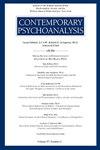Transference, Countertransference and Mourning the Death of a Parent
IF 0.2
4区 心理学
Q4 PSYCHIATRY
引用次数: 0
Abstract
Abstract The decline and death of an adult patient’s parent impacts treatment in ways that are often out of the awareness of analyst and patient. Internal and external family constellations, dynamics, and defenses become unsettled. A patient may unconsciously revert to earlier ways of being as they try to adapt to the changing nature of the parent/child relationship. In this adaptation, behaving and feeling as one did at an earlier time symbolically turns the present into the past. Thus, time is symbolically reversed. This rekindling of childhood fantasies—often emanating from envy, jealousy, and competition—can affect the transference and countertransference as well as the nature of the mourning process itself. Enactments, resistances, and returns to historic ways of relating become a greater part of the analytic experience. Modifications in understanding the mourning process and how it impacts transference, countertransference, and termination are illustrated with clinical examples.移情,反移情和哀悼父母的死亡
摘要成年患者父母的衰落和死亡对治疗的影响往往超出了分析人员和患者的意识。内部和外部的家庭星座、动态和防御变得不稳定。当患者试图适应父母/孩子关系不断变化的本质时,他们可能会无意识地恢复到以前的生活方式。在这种适应中,行为和感觉就像以前一样,象征性地将现在变成了过去。因此,时间象征性地颠倒了。童年幻想的重新点燃——通常源于嫉妒、嫉妒和竞争——会影响移情和反移情,以及哀悼过程本身的性质。对历史关联方式的实施、抵制和回归成为分析经验的更大组成部分。通过临床例子说明了在理解哀悼过程及其如何影响移情、反移情和终止方面的改进。
本文章由计算机程序翻译,如有差异,请以英文原文为准。
求助全文
约1分钟内获得全文
求助全文

 求助内容:
求助内容: 应助结果提醒方式:
应助结果提醒方式:


